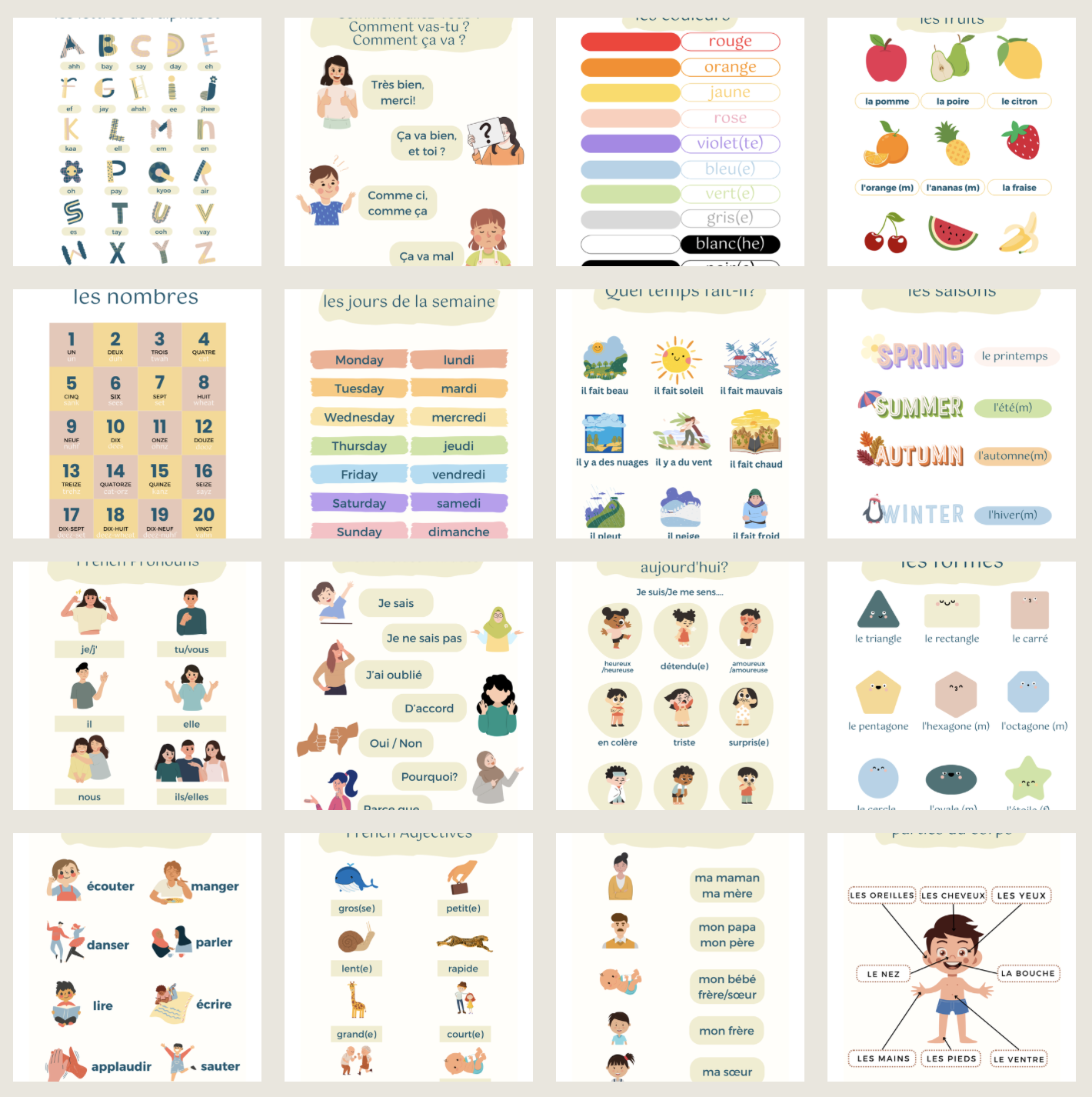Navigating the Path to Bilingualism: 5 Tips for Raising a French-Speaking Child
As parents, we all want our children to have the opportunity to explore the world and communicate with people from diverse backgrounds. Learning a second language, such as French, can open up a world of possibilities for our kids. However, the journey to bilingualism can feel daunting at times. Fear not! In this blog post, we'll share five practical tips to help your child thrive in their French language learning journey.
1. Immerse Them in the Language
The key to effective language acquisition is consistent exposure. Surround your child with French as much as possible – play French music, watch French cartoons or movies, read French books, and engage them in French conversation during everyday activities. The more they hear and use the language, the faster they'll become comfortable and proficient.
Youtube French Song and cartoons list : Beginner Level
Youtube French Song and cartoons list : Intermediate Level
2. Make it Fun and Engaging
Learning a new language can be challenging, so it's important to keep it lighthearted and enjoyable. Incorporate games, songs, and interactive activities into your child's French learning. Encourage them to explore French culture and traditions, as this can help make the language more relatable and interesting.
French Game Online:
3. Encourage Consistent Practice
Set aside regular, dedicated time for your child to practice French, whether it's through Classes, homework, language apps, or simple conversations. Praise their efforts and celebrate their progress, even if they make mistakes. Consistent practice is key to building fluency and confidence.
4. Seek Out Additional Resources
Explore French language learning apps, websites, and multimedia resources to supplement your child's learning and keep them engaged. By providing children with a diverse range of French resources, we can foster their language skills and cultural appreciation.
Free Elementary French Resources for Children:
Alphabet Letters:
Learning the French alphabet is the first step towards mastering the language. Introduce children to the unique sounds and pronunciation of each letter, helping them build a strong foundation for future learning.Greetings:
Teach children common greetings such as "Comment allez-vous?" (How are you?), "Comment vas-tu?" (How are you?), and "Comment ça va?" (How's it going?). These phrases will enable them to initiate conversations and connect with French speakers.Colors:
Introduce children to the vibrant world of colors in French. Teach them the names of different colors, enabling them to describe objects and express their preferences.Fruits:
Expand children's vocabulary by teaching them the names of popular fruits in French. This topic not only enhances their language skills but also promotes healthy eating habits.Numbers:
Learn numbers in French, from counting to basic arithmetic. This foundational knowledge will help children in various aspects of daily life, such as telling time and shopping.Days of the Week:
Introduce the days of the week in French. Teach children the order of the days and their corresponding pronunciations, providing them with the ability to discuss schedules and plan activities.Weather:
Explore weather-related vocabulary in French. Teach children how to describe different weather conditions, fostering their ability to engage in weather-related conversations.Seasons:
Teach children the names of the seasons in French. Discuss the characteristics and activities associated with each season, fostering an understanding of the cyclical nature of time.Pronouns:
Introduce French pronouns, such as "je" (I), "tu" (you), and "il/elle" (he/she). Help children grasp the concept of subject pronouns and their usage in constructing sentences.Classroom Phrases:
Equip children with common French phrases used in the classroom setting. Phrases like "Puis-je aller aux toilettes?" (May I go to the restroom?) and "Je ne comprends pas" (I don't understand) will facilitate effective communication in a French learning environment.How are you today?:
Expand on greetings by teaching children how to ask "Comment ça va aujourd'hui?" (How are you today?). This phrase adds a personal touch to their conversational skills and encourages social interactions.Shapes:
Introduce children to basic shapes in French. Teach them the names of shapes like "cercle" (circle), "carré" (square), and "triangle" (triangle), fostering their spatial awareness and geometric understanding.Verbs:
Introduce common French verbs to children. From "aller" (to go) to "manger" (to eat), these verbs will help children express actions and construct sentences.Adjectives:
Expand children's vocabulary by teaching them French adjectives. Words like "grand" (tall), "petit" (small), and "beau/belle" (beautiful) allow them to describe people, objects, and experiences.Family Members:
Teach children the names of family members in French. This topic not only enhances their language skills but also promotes a sense of cultural identity and family values.Body Parts:
Introduce children to the names of body parts in French. This topic helps them develop a better understanding of their own bodies while expanding their vocabulary.
5. Join the Early French Class in LWL Education
Enroll your child in the Early French class! These classes provide a structured and immersive learning environment, with experienced teachers and a curriculum designed to develop proficiency in French. Participation in the Early French class will give your child a strong foundation in the language and prepare them for more advanced French courses in the future.
-
1) An introduction to French! Your guide to the basics.
2) French alphabet, numbers, and colours introduced
3) 12 learning themes with cue cards and worksheets
4) Vocabulary retention through matching activities
-
1) Gather vocabulary and concepts for simple interactions.
2) Verb conjugation introduced
3) 12 learning themes with cue cards and worksheets
4) Prepositions, adjectives, and possessives introduced
-
1) Engage in basic conversation and navigate common situations.
2) Consolidate grammatical structure and vocabulary
3) Master the French tenses
4) Gain an understanding of French culture
Are you seeking additional support for your kids?
We offer high-quality French language classes aimed at helping students realize their potential. Our curriculum is designed to enhance students' language skills, cultural awareness, and communication abilities.



